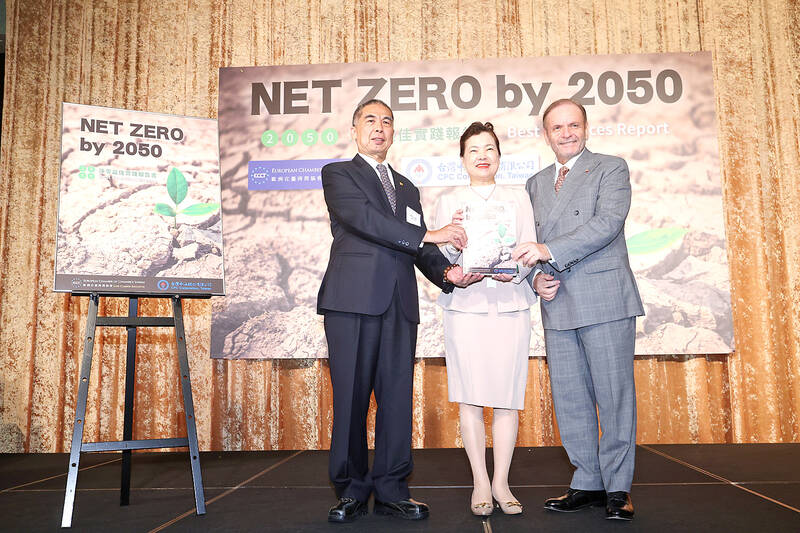CPC Corp, Taiwan (CPC, 台灣中油) has reduced its carbon emissions by more than 30 percent from 2005 levels and continues to work toward achieving its medium-term goal of cutting emissions by 49.5 percent by 2030 and its long-term goal of achieving net zero emissions by 2050, the state-run refiner said
CPC must strive to achieve a steady supply of energy to meet demand in Taiwan, and formulate a strategy for its transformation in the net zero era, CPC chairman Lee Shun-chin (李順欽) said in a keynote speech at the launch of the company’s net zero report in Taipei.
The company and the European Chamber of Commerce Taiwan (ECCT) released the Net Zero by 2050 Best Practices Report at the Grand Hyatt Taipei (台北君悅酒店), which was attended by Minister of Economic Affairs Wang Mei-hua (王美花), CPC said in a statement.

Photo: CNA
Edited by KPMG Taiwan, the report showcases CPC’s net zero transition strategy, international policies and corporate responses to net zero emissions, as well as European energy policy measures and the best solutions for net zero transition, CPC said.
“European countries play a pioneering and leading role in net zero development, and European companies are also leading the world in the research and development of low-carbon energy solutions and technologies,” Lee said in the statement.
“Therefore, CPC once again cooperated with the ECCT to provide the latest developments and industry responses for net zero-related policies, regulations and industry solutions, including hydrogen energy, energy storage, electric vehicles, carbon capture, storage and reuse,” he added.
CPC said the report aims to offer key expertise and valuable experience in net zero transformation from the company and ECCT members to provide the government and local industries to aid Taiwan’s attainment of its goal of net zero emissions by 2050.
During the event, Wang gave a keynote speech on Taiwan’s net zero policy and received a copy of the report from Lee and ECCT vice chairman Giuseppe Izzo, CPC said.
Wang said the ministry has pushed an energy transition by promoting renewable energy development and cutting carbon emissions is the first step on the path toward achieving Taiwan\\\\'s net-zero emissions goal by 2050.
Among renewable energy, Taiwan will add 2.5 gigawatts of solar power generation capacity this year, which would top the previous high of 1.883GW last year and be the most installed in a single year if achieved, Wang said.
Wang also reiterated the ministry\\\\'s goal to reach a total of 200 offshore wind turbines installed by the end of this year, with 100 installed this year as of late last month to bring the total to 143.
As the report was released to coincide with the first day of the EU’s Climate Action Week, European Economic and Trade Office in Taiwan Director Filip Grzegorzewski was invited to talk about the EU’s climate policy, while KPMG Sustainability Consulting Co (安侯永續發展顧問) managing director Niven Huang (黃正忠) gave a presentation summarizing the highlights of the report, CPC said.
Additional reporting by CNA

POWERING UP: PSUs for AI servers made up about 50% of Delta’s total server PSU revenue during the first three quarters of last year, the company said Power supply and electronic components maker Delta Electronics Inc (台達電) reported record-high revenue of NT$161.61 billion (US$5.11 billion) for last quarter and said it remains positive about this quarter. Last quarter’s figure was up 7.6 percent from the previous quarter and 41.51 percent higher than a year earlier, and largely in line with Yuanta Securities Investment Consulting Co’s (元大投顧) forecast of NT$160 billion. Delta’s annual revenue last year rose 31.76 percent year-on-year to NT$554.89 billion, also a record high for the company. Its strong performance reflected continued demand for high-performance power solutions and advanced liquid-cooling products used in artificial intelligence (AI) data centers,

SIZE MATTERS: TSMC started phasing out 8-inch wafer production last year, while Samsung is more aggressively retiring 8-inch capacity, TrendForce said Chipmakers are expected to raise prices of 8-inch wafers by up to 20 percent this year on concern over supply constraints as major contract chipmakers Taiwan Semiconductor Manufacturing Co (TSMC, 台積電) and Samsung Electronics Co gradually retire less advanced wafer capacity, TrendForce Corp (集邦科技) said yesterday. It is the first significant across-the-board price hike since a global semiconductor correction in 2023, the Taipei-based market researcher said in a report. Global 8-inch wafer capacity slid 0.3 percent year-on-year last year, although 8-inch wafer prices still hovered at relatively stable levels throughout the year, TrendForce said. The downward trend is expected to continue this year,

Vincent Wei led fellow Singaporean farmers around an empty Malaysian plot, laying out plans for a greenhouse and rows of leafy vegetables. What he pitched was not just space for crops, but a lifeline for growers struggling to make ends meet in a city-state with high prices and little vacant land. The future agriculture hub is part of a joint special economic zone launched last year by the two neighbors, expected to cost US$123 million and produce 10,000 tonnes of fresh produce annually. It is attracting Singaporean farmers with promises of cheaper land, labor and energy just over the border.

US actor Matthew McConaughey has filed recordings of his image and voice with US patent authorities to protect them from unauthorized usage by artificial intelligence (AI) platforms, a representative said earlier this week. Several video clips and audio recordings were registered by the commercial arm of the Just Keep Livin’ Foundation, a non-profit created by the Oscar-winning actor and his wife, Camila, according to the US Patent and Trademark Office database. Many artists are increasingly concerned about the uncontrolled use of their image via generative AI since the rollout of ChatGPT and other AI-powered tools. Several US states have adopted